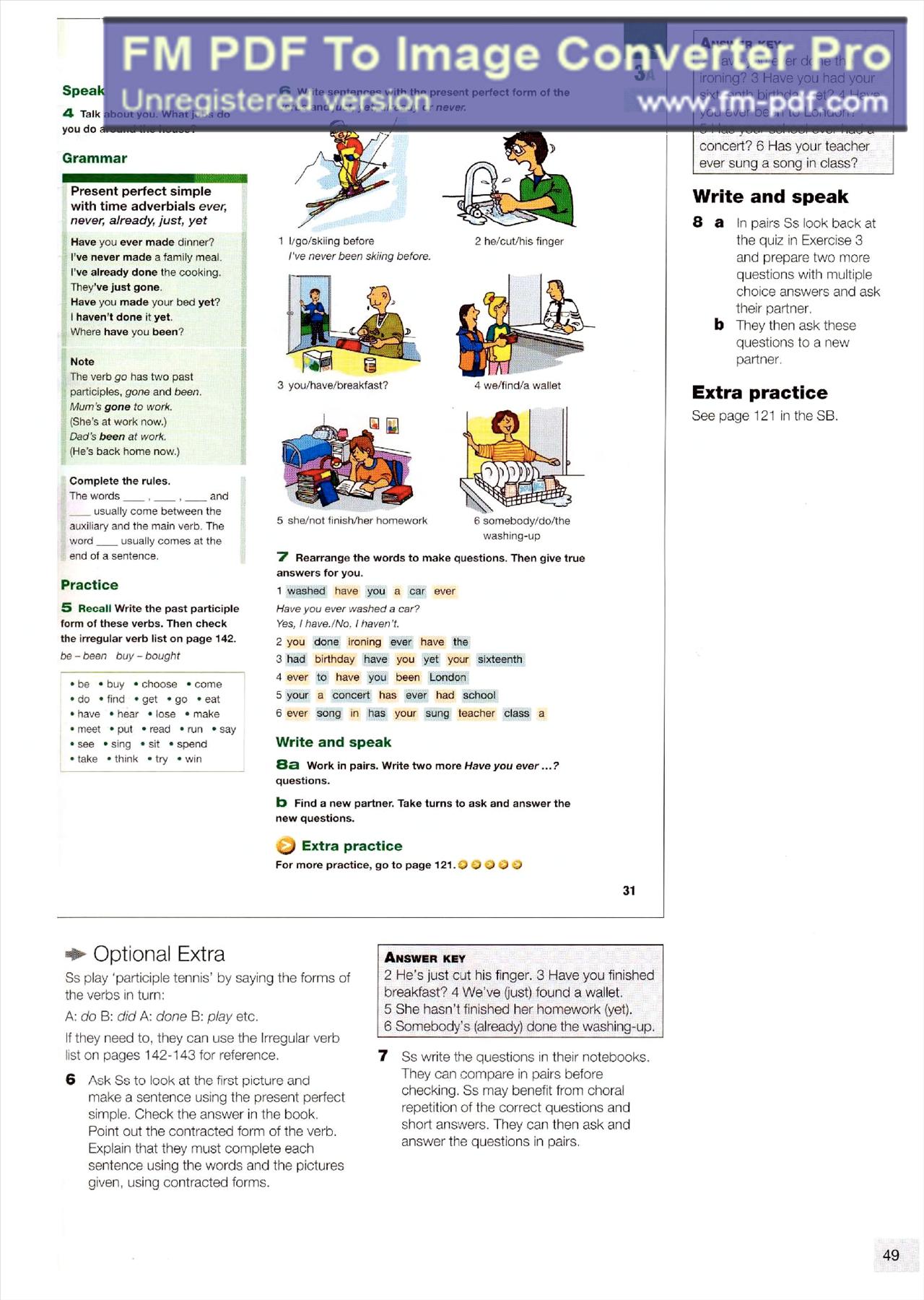Up¾at 3 Teacher's Book podrecznik nauczyciela plus odpowiedzi ,testy,klucz answer key Page 048


Have you ever madę dinner? I’ve never madę a family meal. I've already done the cooking. They’ve just gone.
Have you madÄ™ your bed yet?
I haven’t done it yet.
Where have you been?
2 he/cut/his finger
concert? 6 Has your teacher ever sung a song in class?
1 l/go/skiing before IVe never been skiing before.

NotÄ™
The verb go has two past participles, gone and been.
Mum s gone to work.
(She's at work now.)
Dad's been at work.
(He’s back home now.)

Complete the rules.
The words
_._,_and
usually come between the auxiliary and the main verb. The
word_usually comes at the
end oł a sentence.
Practice
5 Recall Write the past participle form of these verbs. Then check the irregular verb list on page 142.
be - been boy - bought
• be • buy • choose • come
• do • find • get • go • eat
• have • hear • lose • make
• meet • put • read • run • say
• see • sing • sit • spend
• take • think • try • win

5 she/not finish/her homework

washing-up
7 Rearrange the words to make questions. Then give true answers for you.
1 washed have you a car ever
Have you ever washed a car?
Yes, I have./No. I haven’t.
2 you done ironing ever have the
3 had birthday have you yet your sixteenth
4 ever to have you been London
5 your a concert has ever had school
6 ever song in has your sung teacher class a
Write and speak
8a Work in pairs. Write two morÄ™ Have you ever...? questions.
b Find a new partner. Take turns to ask and answer the new questions.
Extra practice
For morÄ™ practice, go to page 121.0 J J O -J
Write and speak
8 a In pairs Ss look back at the quiz in Exercise 3 and prepare two morÄ™ questions with multiple choice answers and ask their partner, b They then ask these que$tion$ to a new partner.
Extra practice
See page 121 in the SB.
Optional Extra
Ss play 'participle tennis’ by saying the forms of the verbs in turn:
A: do B: did A: done B: play etc.
If they need to, they can use the Irregular verb list on pages 142-143 for reference.
6 Ask Ss to look at the first picture and make a sentence using the present perfect simple. Check the answer in the book.
Point out the contracted form of the verb. Explain that they must complete each sentence using the words and the pictures given, using contracted forms.
Answer key
2 He’s just cut his finger. 3 Have you finished
breakfast? 4 We’ve (just) found a wallet.
5 She hasn’t finished her homework (yet).
6 Somebody’s (already) done the washing-up.
7 Ss write the questions in their notebooks. They can compare in pairs before checking. Ss may benefit from chorał repetition of the correct questions and short answers. They can then ask and answer the questions in pairs.
49
Wyszukiwarka
Podobne podstrony:
Up?at 3 Teacher s Book podrecznik nauczyciela plus odpowiedzi ,testy,klucz answer key Page 001 FM PD
Up?at 3 Teacher s Book podrecznik nauczyciela plus odpowiedzi ,testy,klucz answer key Page 005 Conte
Up?at 3 Teacher s Book podrecznik nauczyciela plus odpowiedzi ,testy,klucz answer key Page 006 Conte
Up?at 3 Teacher s Book podrecznik nauczyciela plus odpowiedzi ,testy,klucz answer key Page 009 FM PD
Up?at 3 Teacher s Book podrecznik nauczyciela plus odpowiedzi ,testy,klucz answer key Page 010 : Rea
Up?at 3 Teacher s Book podrecznik nauczyciela plus odpowiedzi ,testy,klucz answer key Page 012 Large
Up?at 3 Teacher s Book podrecznik nauczyciela plus odpowiedzi ,testy,klucz answer key Page 013 u mfo
Up?at 3 Teacher s Book podrecznik nauczyciela plus odpowiedzi ,testy,klucz answer key Page 014 selec
Up?at 3 Teacher s Book podrecznik nauczyciela plus odpowiedzi ,testy,klucz answer key Page 015 MMMMM
Up?at 3 Teacher s Book podrecznik nauczyciela plus odpowiedzi ,testy,klucz answer key Page 018 Sugge
więcej podobnych podstron